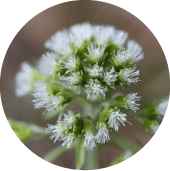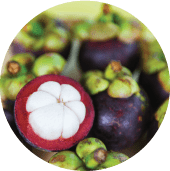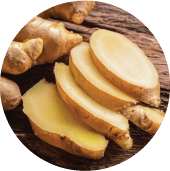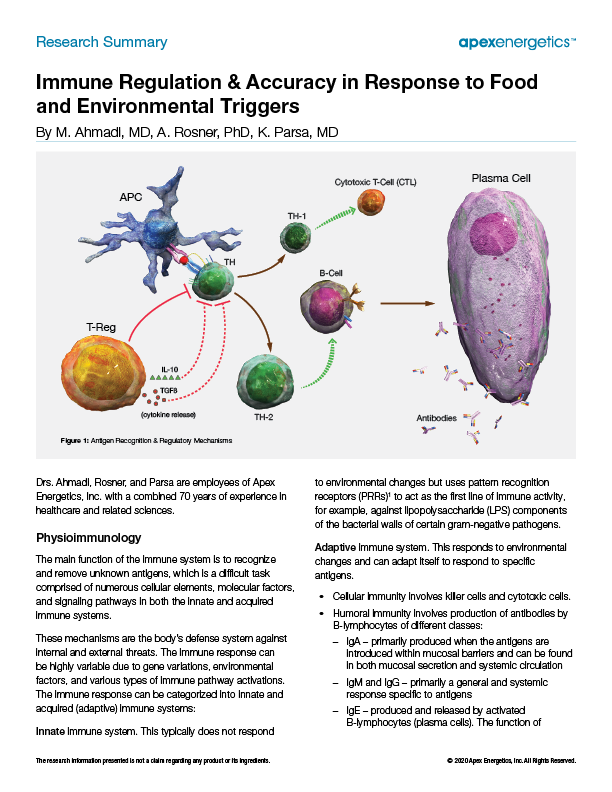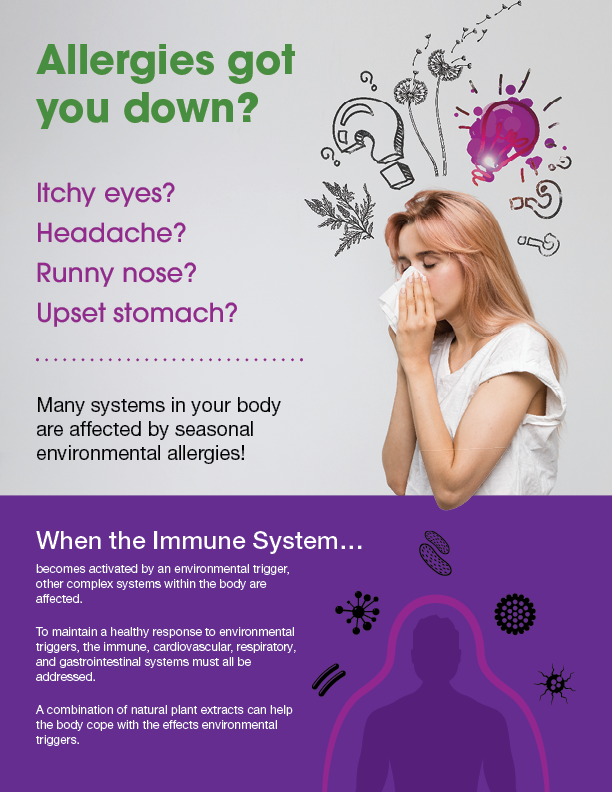Histamine Response

As patients begin to venture outdoors after the coronavirus lockdown, they may suffer some effects of environmental allergens.
In this first HIstamine Response Research Spotlight, we are presenting exciting evidence about compounds that dampen the immune response to environmental triggers while addressing effects on related systems.
Disruptions in the Immune Response to Environmental Triggers
The immune response to environmental triggers is a multifaceted physiological process that involves interaction with other complex systems in the body—the cardiovascular, gastrointestinal, and respiratory systems. One of the vital functions of the cardiovascular system is to deliver nutrients and immune cells to tissues, allowing the body to fight infection and retain healthy immunity. The gastrointestinal and immune systems also work closely with one another in that certain commensal bacteria in the gut are responsible for signaling immune cell function/production and producing nutrients that impact immunity. The respiratory system is a complex defense system which relies on both innate and adaptive immunity to protect against antigens.
Disruptions in interactions between these systems may compromise the immune response. For some individuals, a compromised immune response can lead to a loss of immune tolerance – a state of unresponsiveness by the immune system. Loss of immune tolerance has the potential to lead to several health conditions, ranging from allergies to autoimmune diseases.
What impacts the immune response?
How well regulatory T-cells are functioning
Diversity of bacterial species in the gut
The rate at which mast cells are activated
Integrity of the gut lining
How well proteins are digested
Mast cell activation plays a significant role in the immune response.
When mast cells become activated, one of the main compounds they release is histamine. Often, a high histamine load indicates a compromised immune response.
Compounds for Improved Immune Response
Certain compounds may improve the immune response to environmental triggers by supporting cardiovascular, gastrointestinal, and respiratory functions.
Butterbur extract contains two important compounds known as sesquiterpenes—a class of terpenes that may have the potential to relax smooth muscle and support the physiological systems related to immune activation and histamine release. Specifically, findings of recent studies suggest that butterbur extract may have a significant effect on seasonal allergic rhinitis due to its role in respiratory health.
Mangosteen extract contains unique polyphenolic compounds known as xanthones, which are known to limit lipid peroxidation and support immune regulation. Mangosteen extract appears to support the cardiovascular system through its ability to limit iNOS activity, and it plays a role in respiratory health through reduction of inflammatory cell recruitment into the airway.
Ginger extract contains gingerols—nonvolatile compounds known to support antioxidant activity, relaxation of smooth muscles in the airway, and proper blood circulation. Gingerols play an especially unique role in regulating arterial blood pressure through multiple pathways, including blockade of voltage-dependent calcium channels. Ginger also supports the digestive system and has been shown to inhibit the production of inflammatory cytokines (IL-1 and TNF-alpha) involved in immune reactions.
Why is this research important?
Environmental triggers are adding to your patients’ histamine load every day, likely causing symptoms related to immune reactivity
Chronic immune reactivity may lead to loss of immune tolerance and histamine overload, resulting in many health complications for your patients
The compounds discussed above address multiple histamine-immune related pathways
RESEARCH SUMMARY
Immune Regulation & Accuracy in Response to Food and Environmental Triggers
Download this research summary to learn more about compounds that support a healthy immune response to environmental triggers.
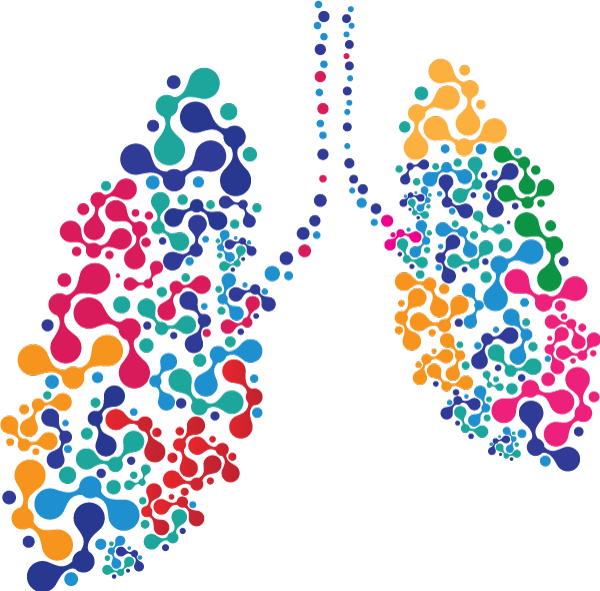
Concerned about your patients’ lung health this season?
The histamine response is intimately linked to inflammation. Compounds used to naturally address histamine pathways may also support lung health:
Quercetin has been shown to address inflammation in the airway and limit viral replication in an innate immune response. Current research, performed in vitro, suggests quercetin may even have broad-spectrum anti-viral properties.
Mangosteen has been shown to mitigate airway inflammation and protect against acute lung damage by counteracting inflammatory cell infiltration into the lung tissue in animal models.
Butterbur, Ginger, and Turmeric extracts also exhibit beneficial effects on lung tissue by reducing airway inflammation in animal models.
Patient Education Toolkit
How to use this information in your clinic.

Histamine Response
Now it’s easy to be “in the know” with FM Spotlight. Each issue will have a research, clinical, or results theme that will be directly applicable to your practice and your patients’ health.
Cross-Reactivity in the Brain


Cross-Reactivity in the Brain Clinical Spotlight
As patients begin to venture outdoors after the coronavirus lockdown, they may suffer some effects of environmental allergens.
In this first Research Spotlight, we are presenting exciting evidence about compounds that dampen the immune response to environmental triggers while addressing effects on related systems.
Histo-X™

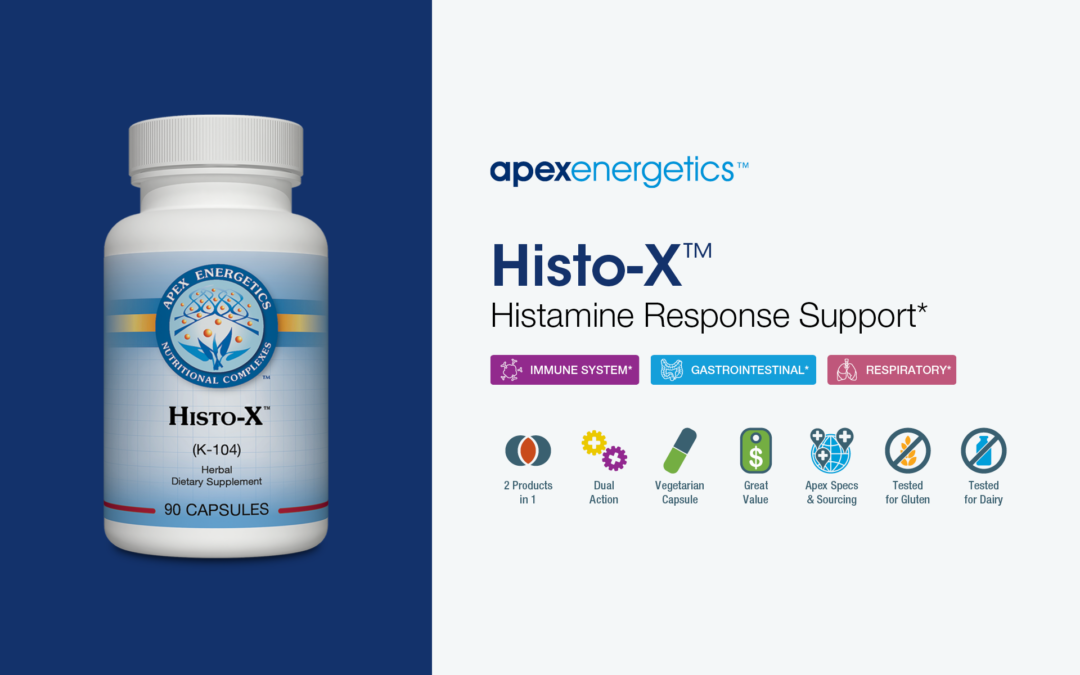
Histo-X™ Results Spotlight
Exposure to environmental triggers can happen any time of year. Outdoors or indoors.
In our previous Spotlights in this series on histamine, we discussed the role this mediator plays in the immune response to environmental triggers. In this Results Spotlight, we present how our unique Histo-X™ formula will benefit your practice and help you get the results you’re after!



